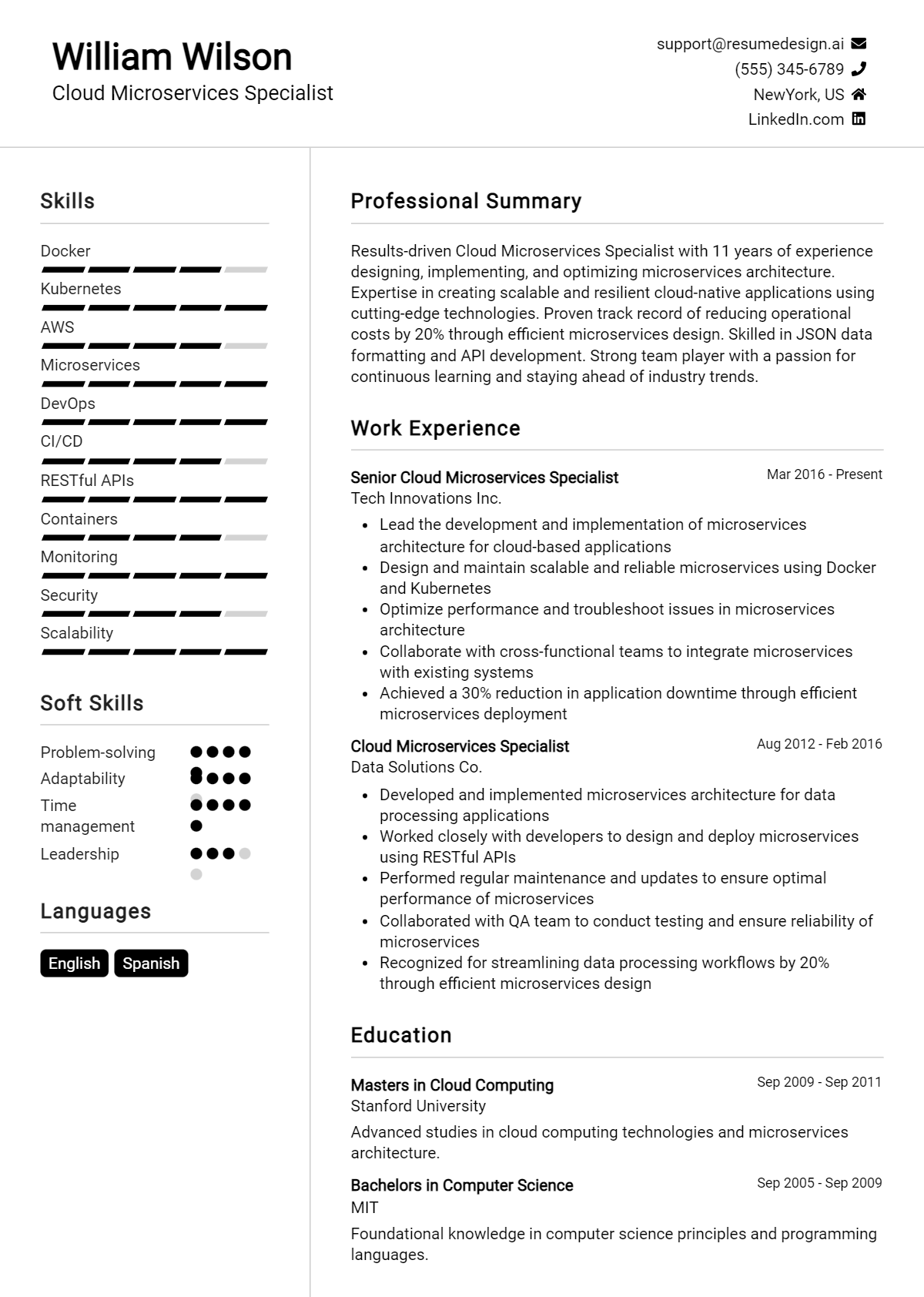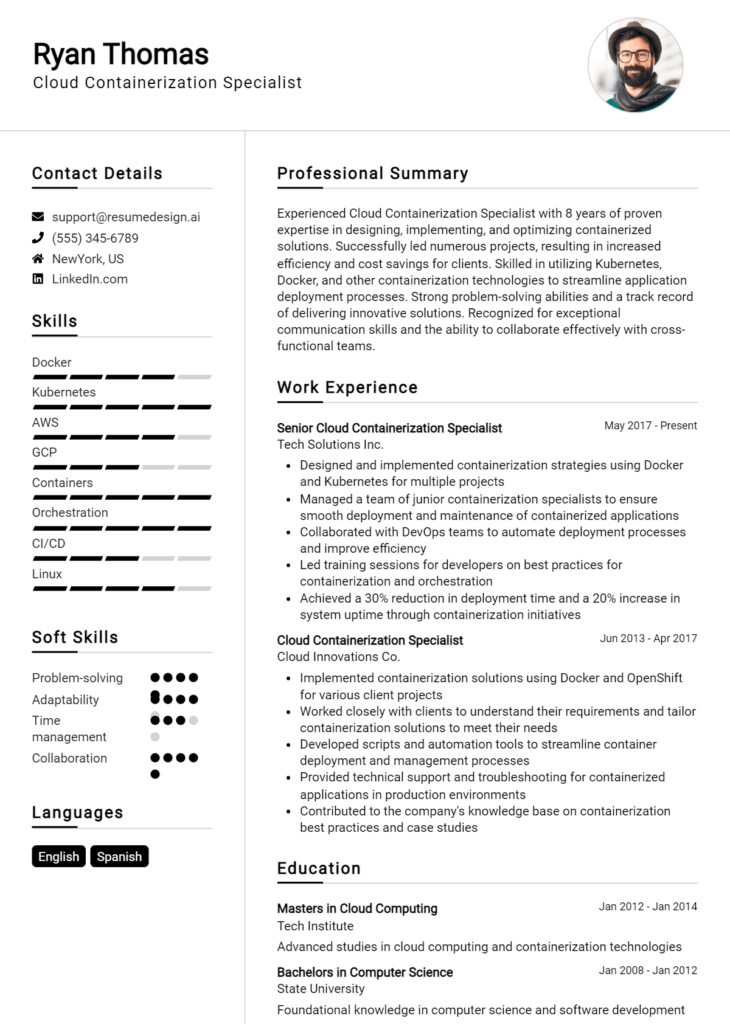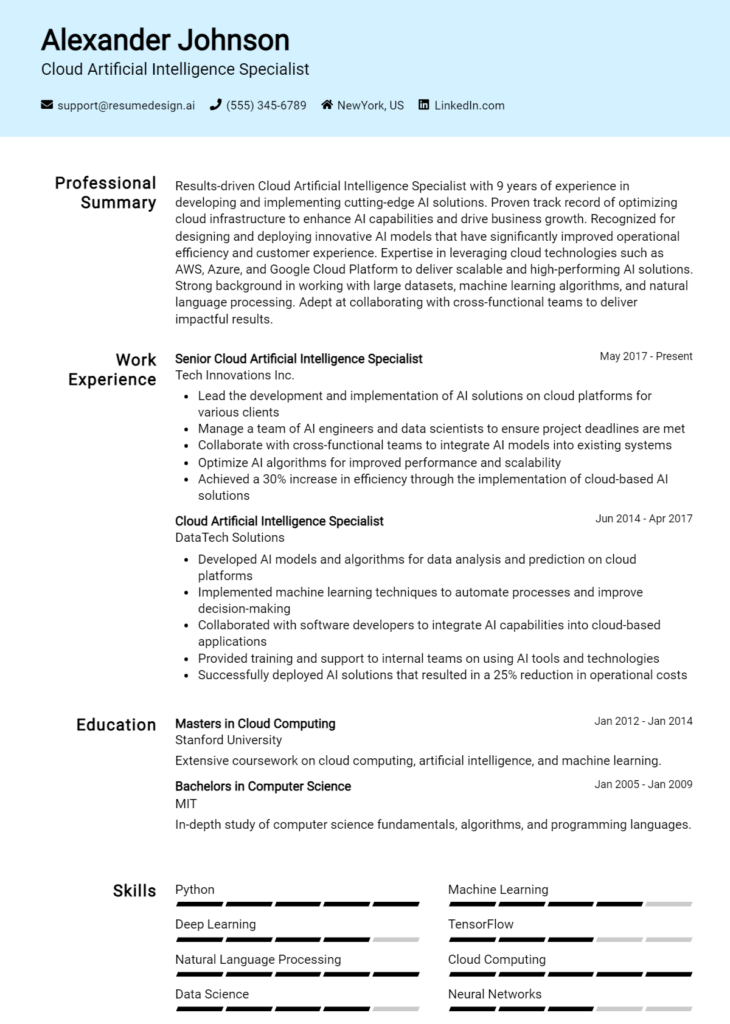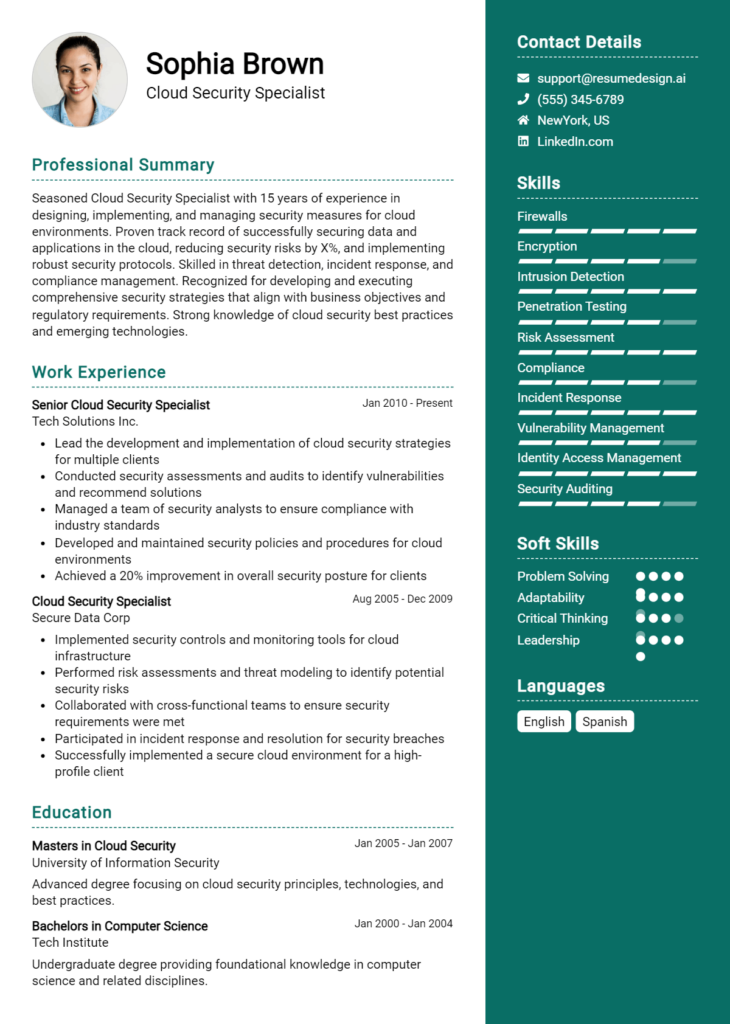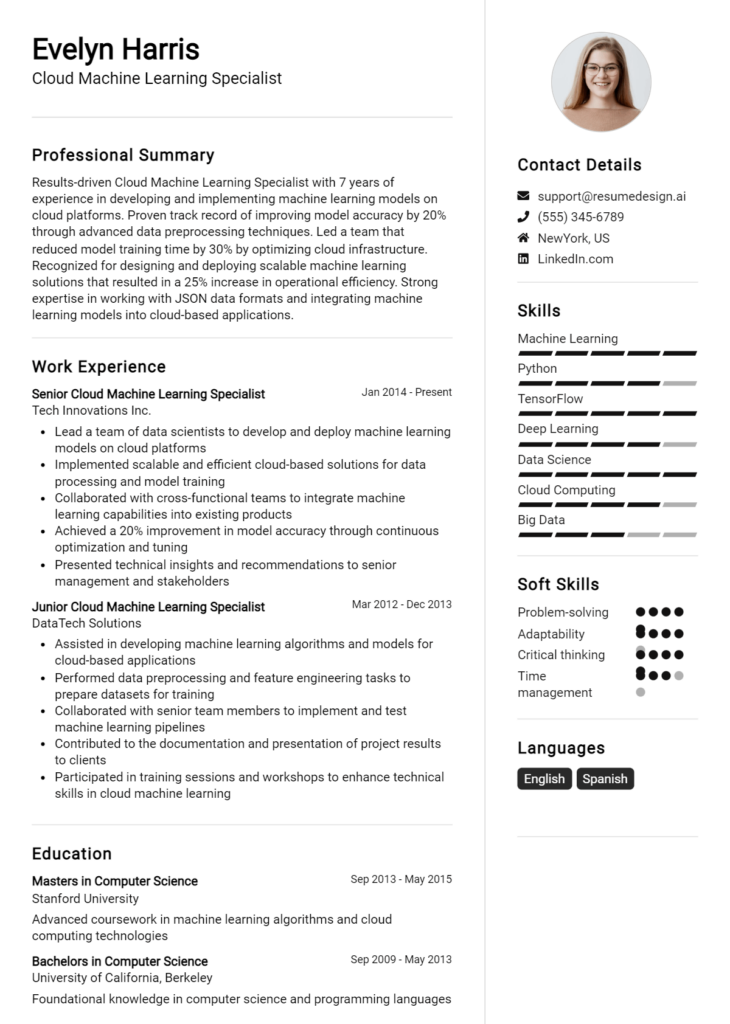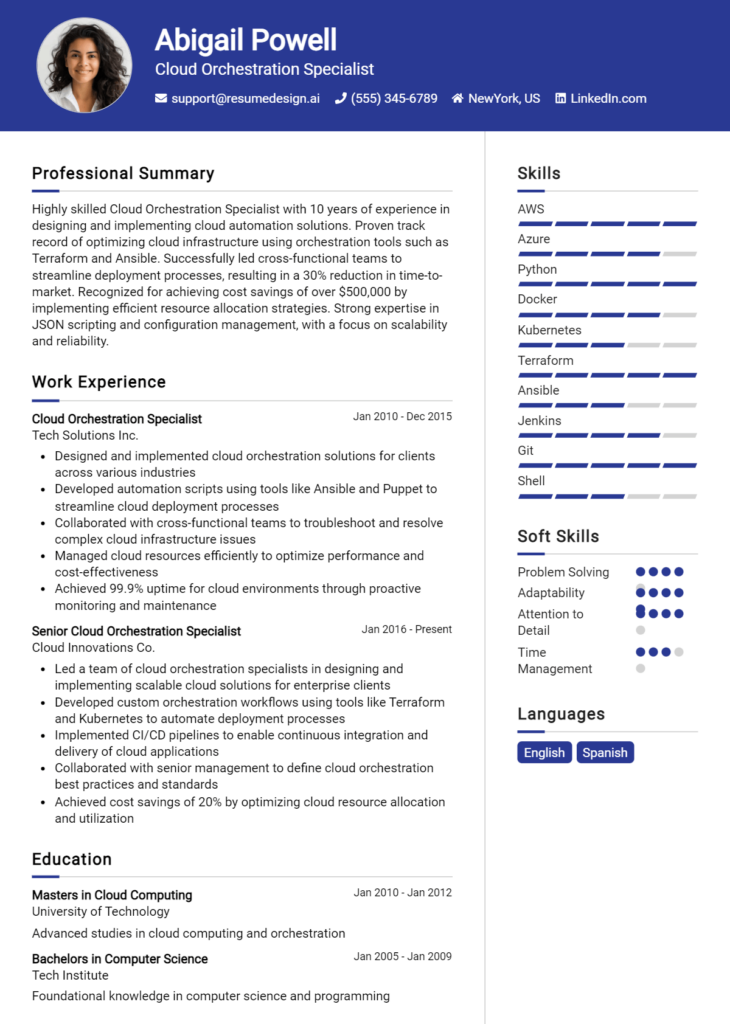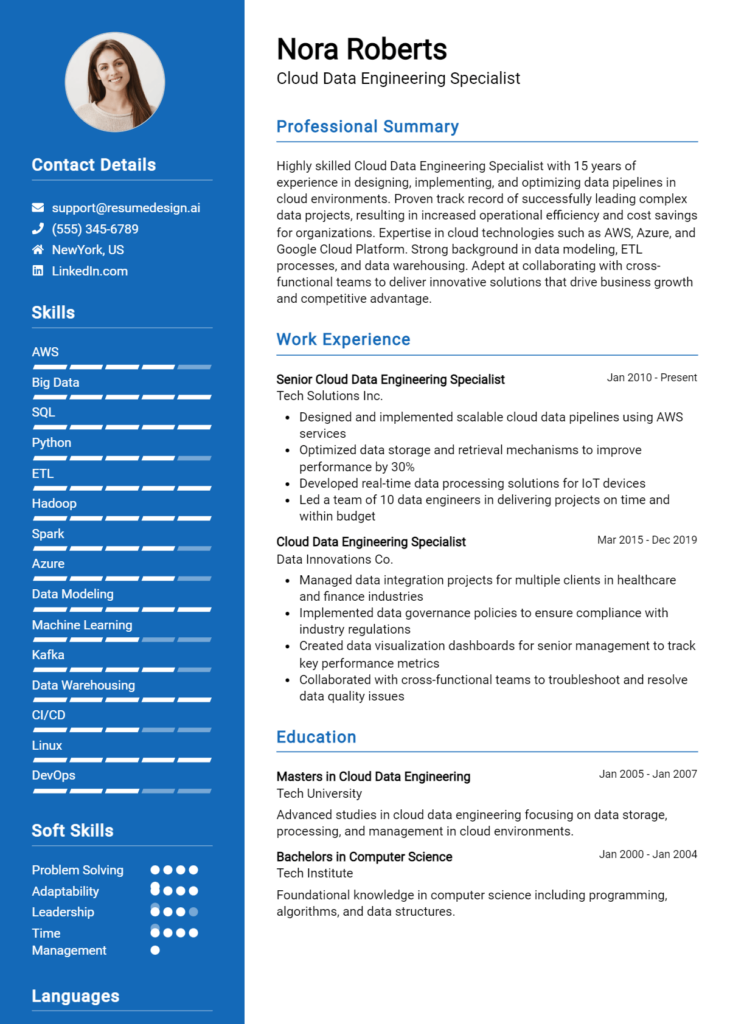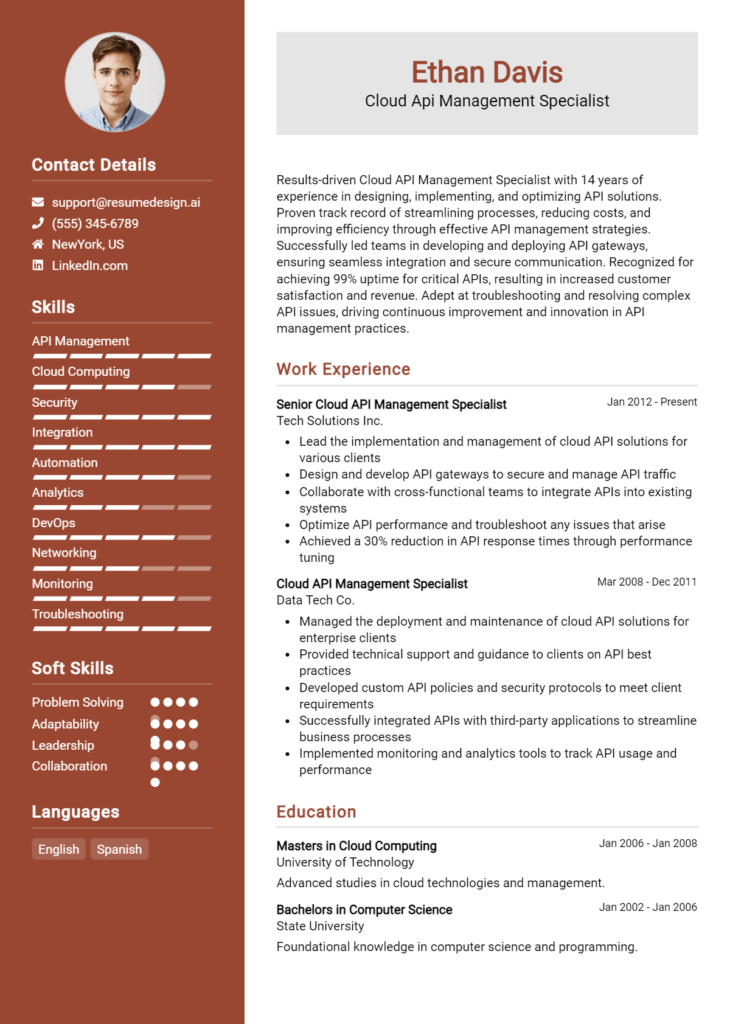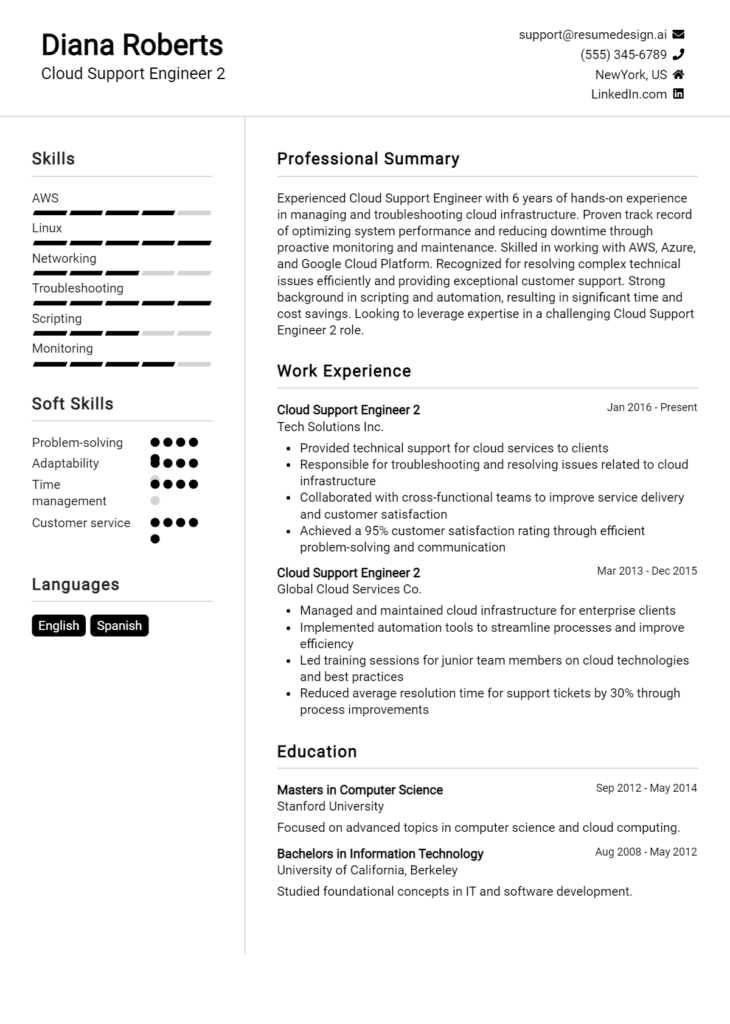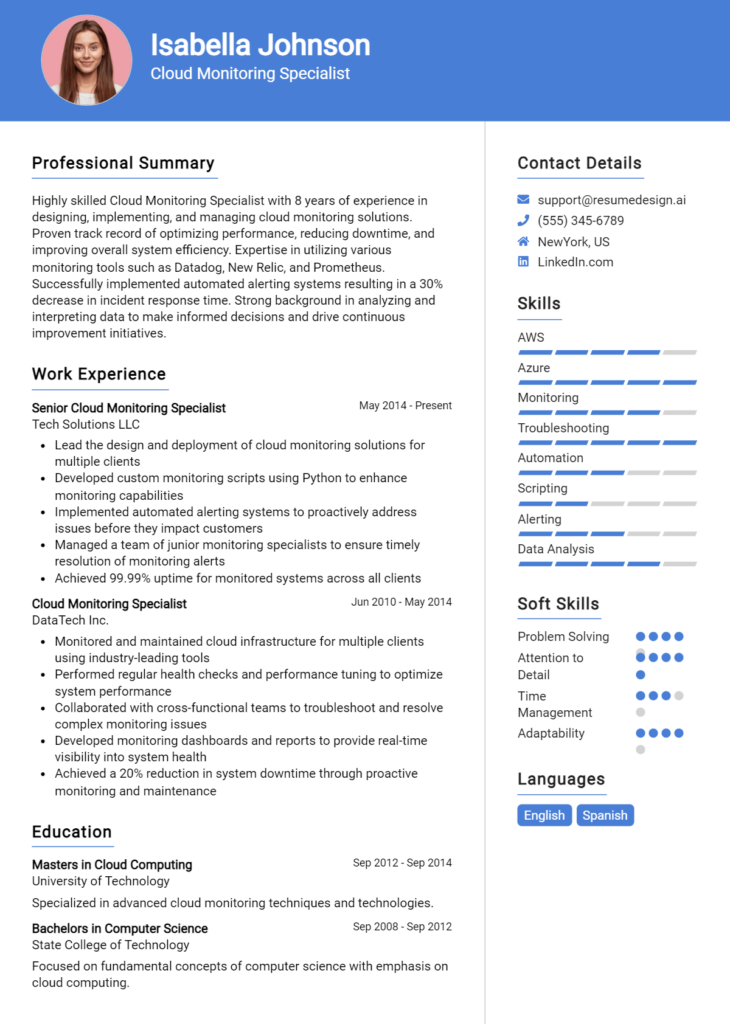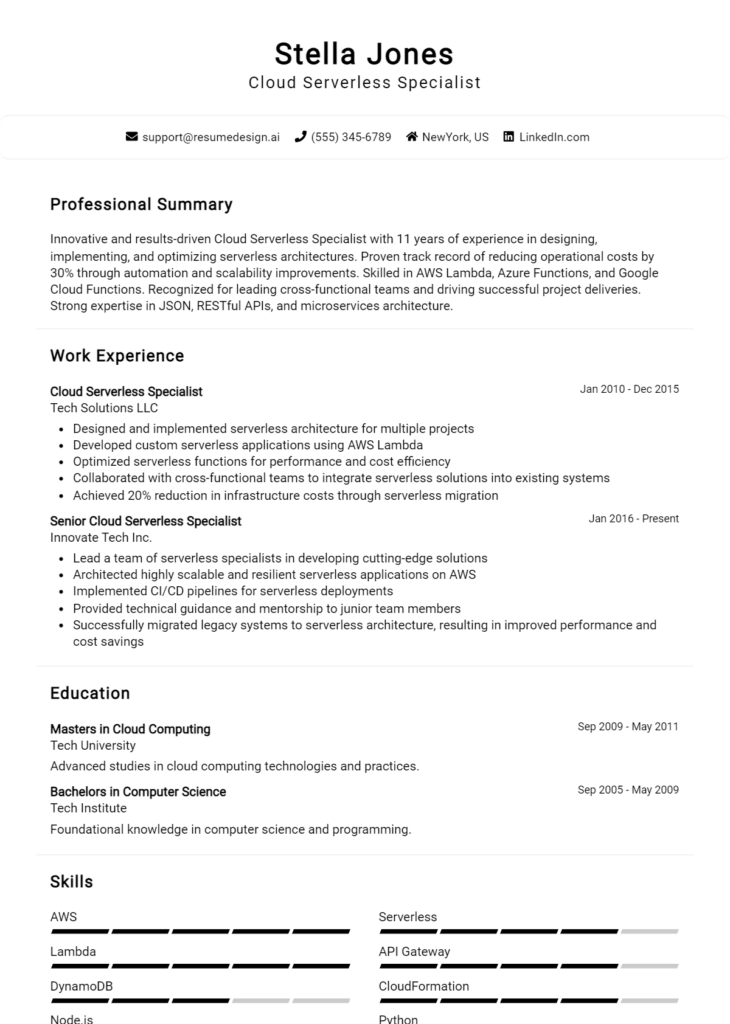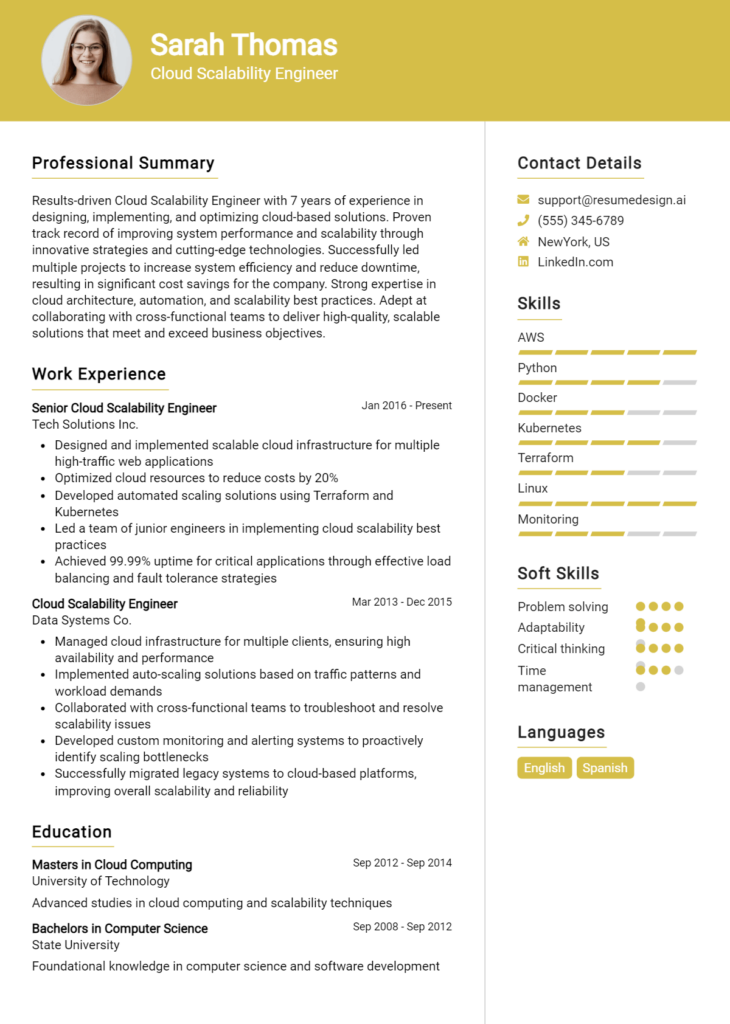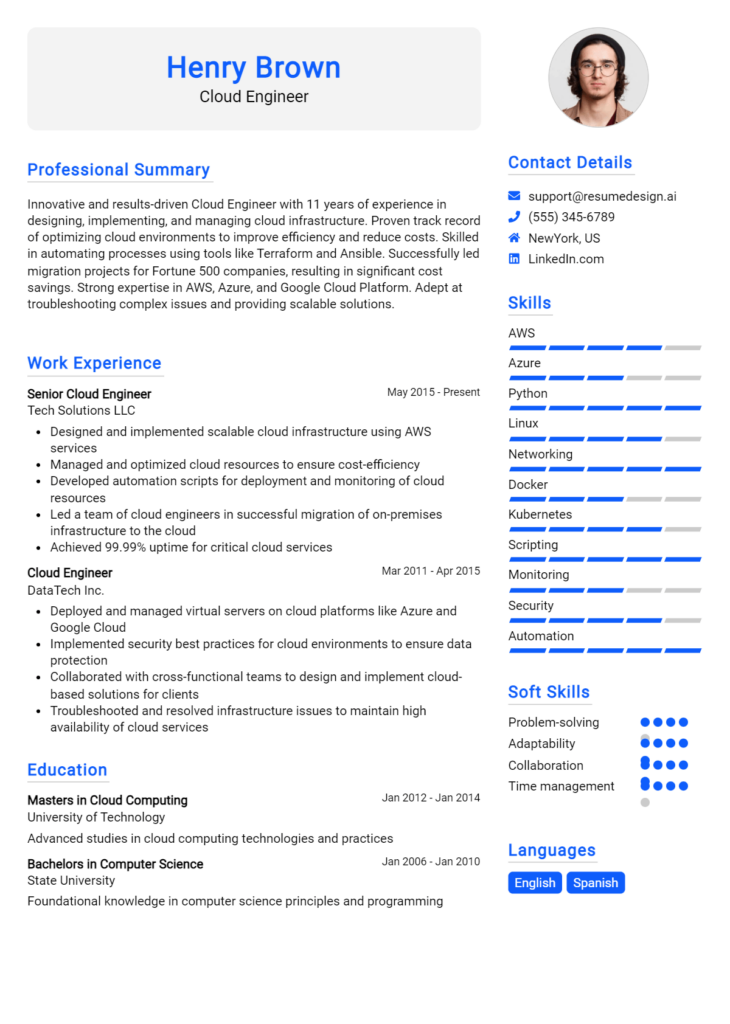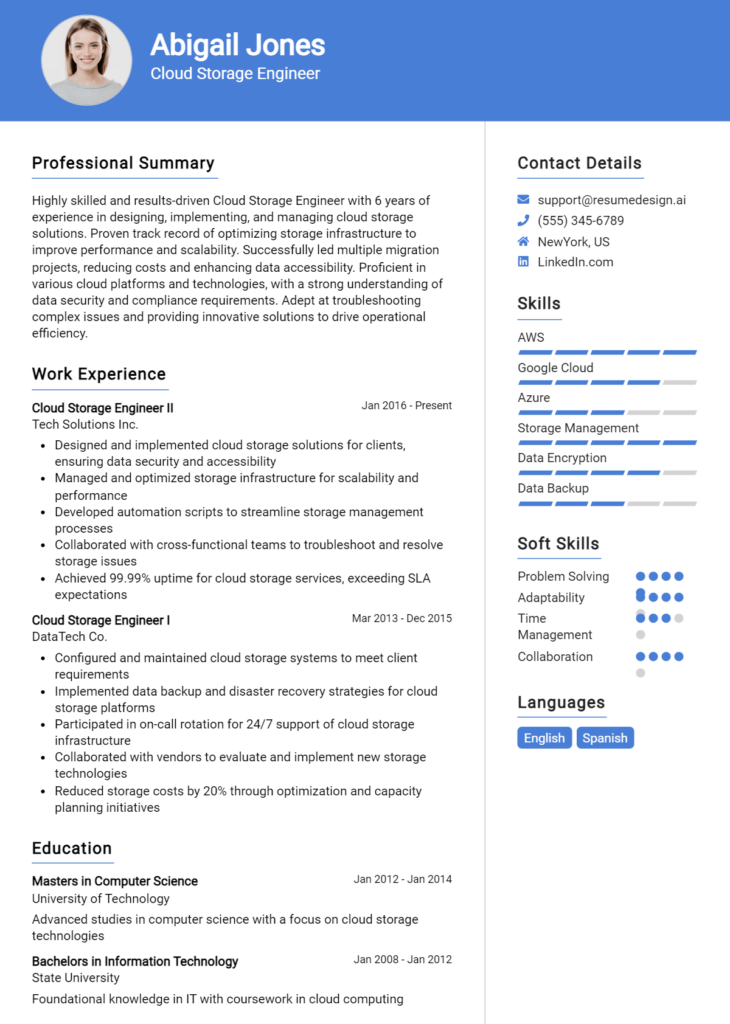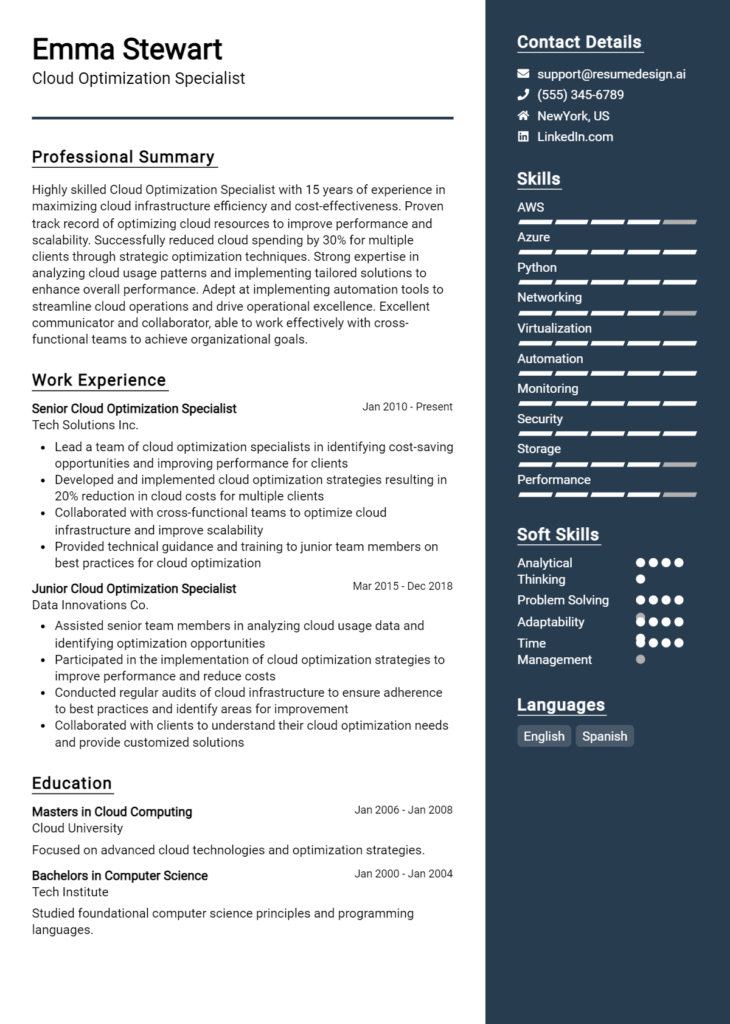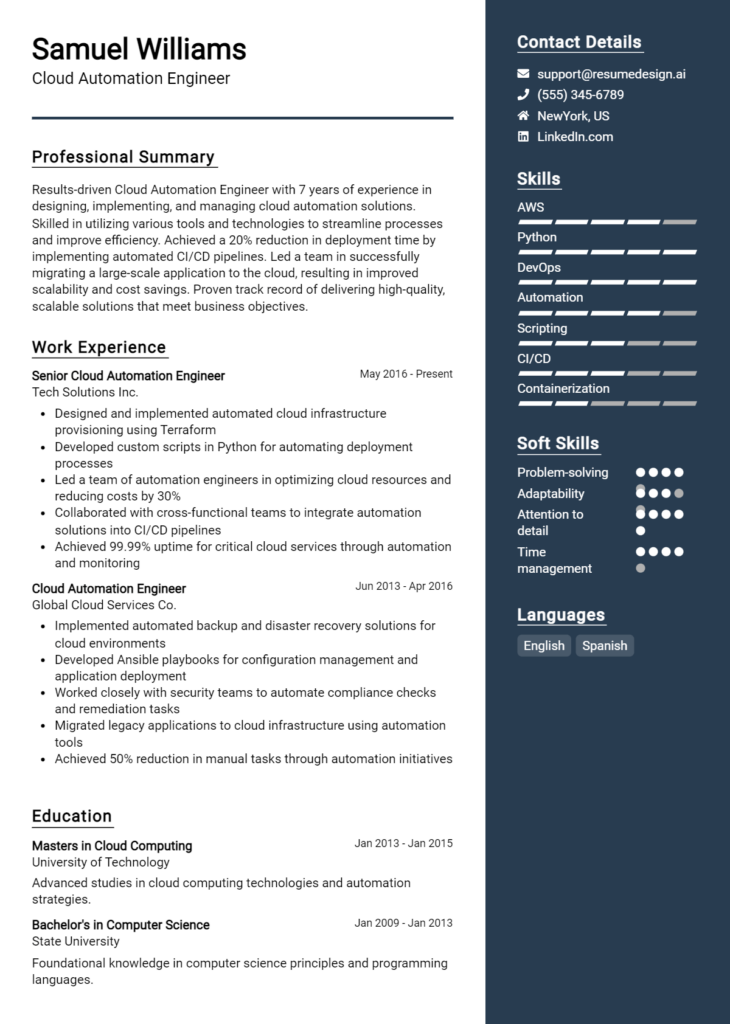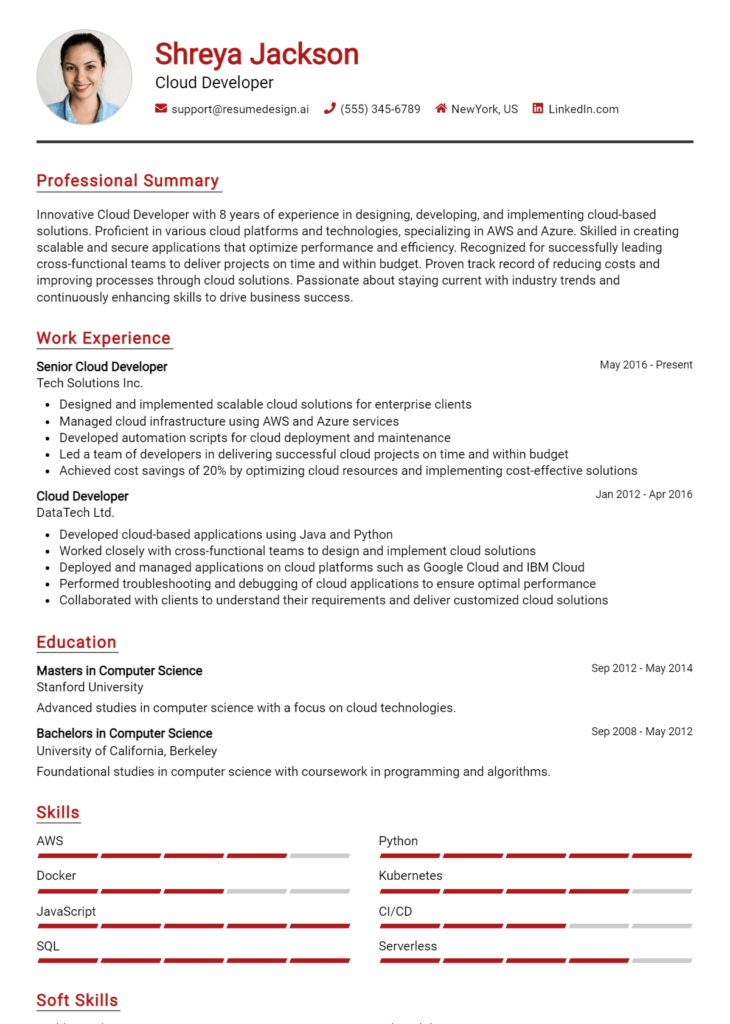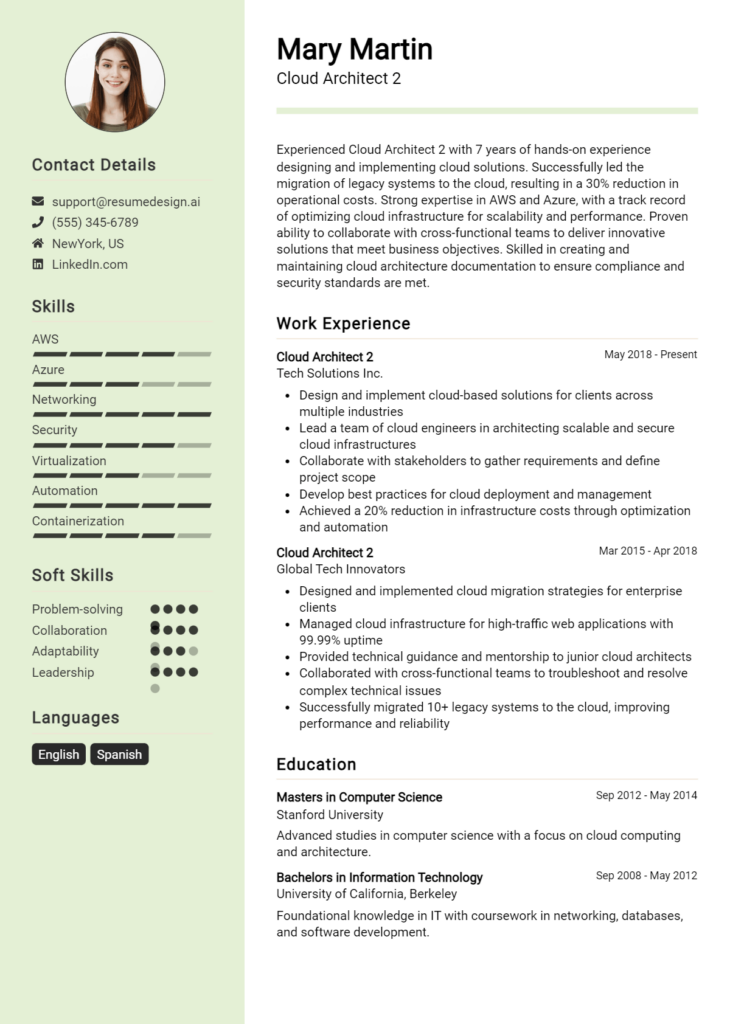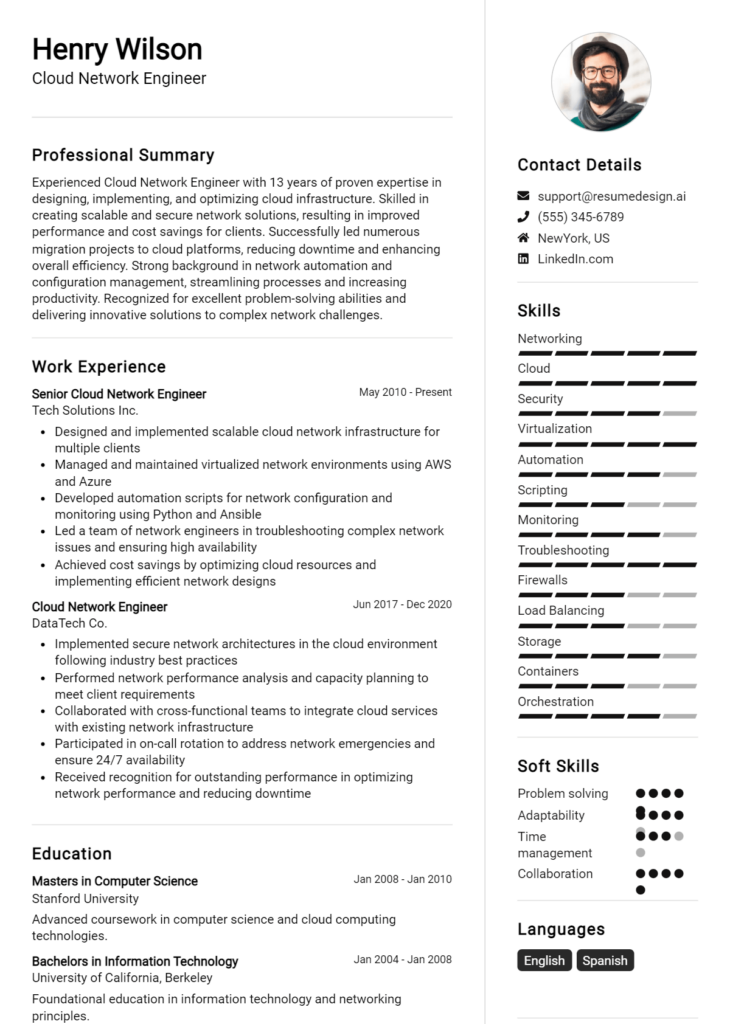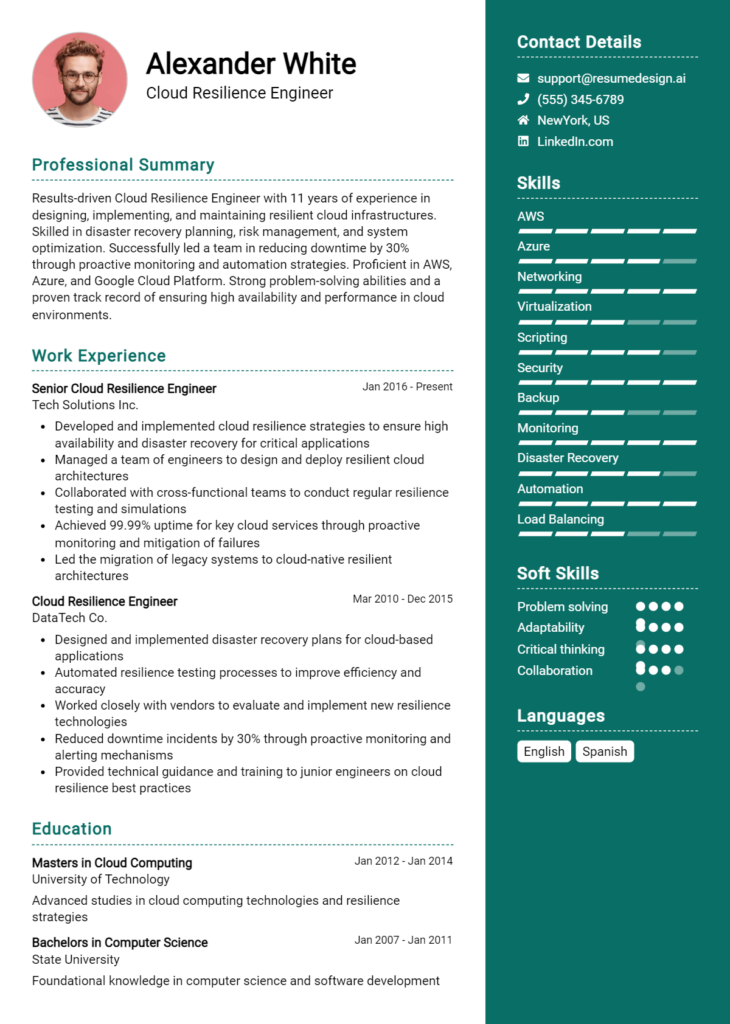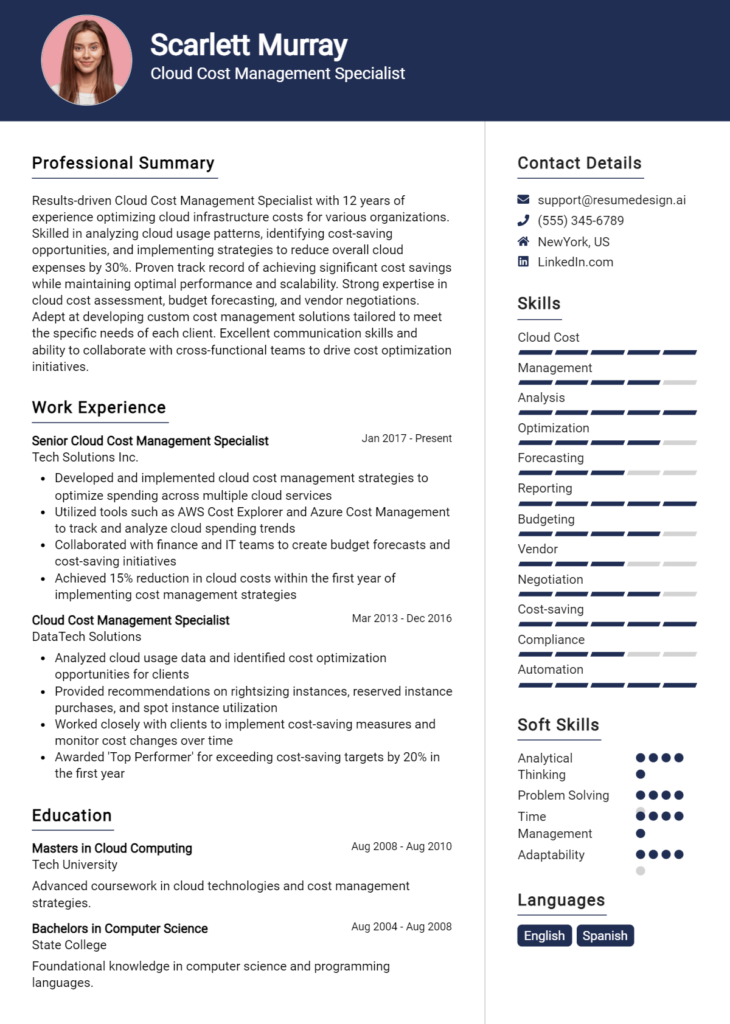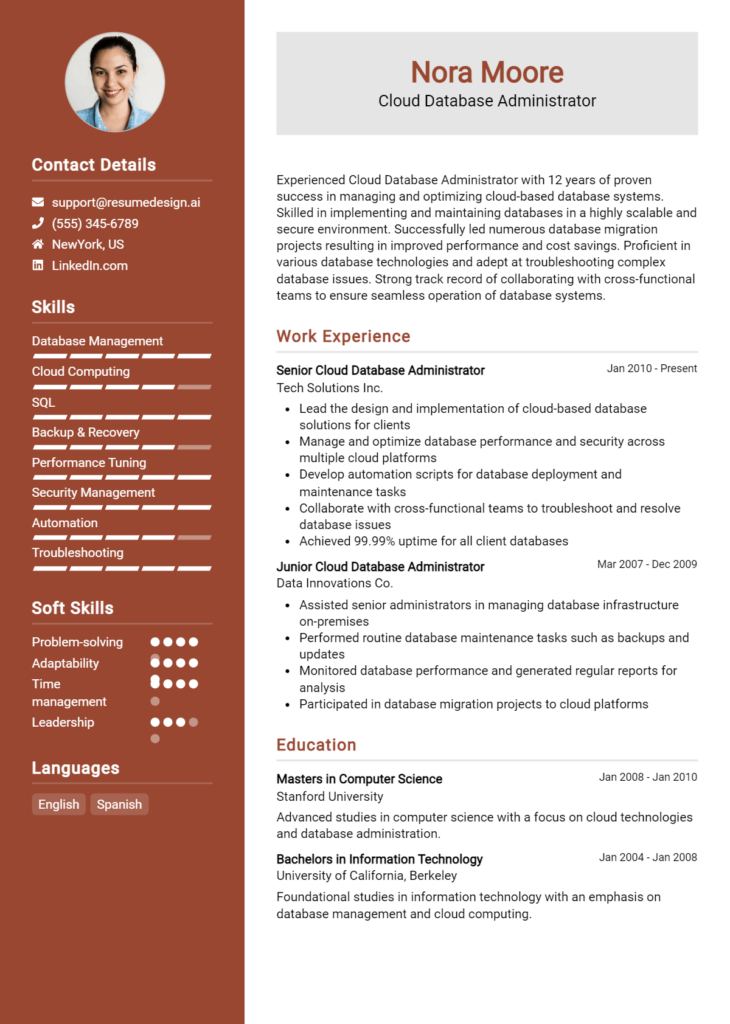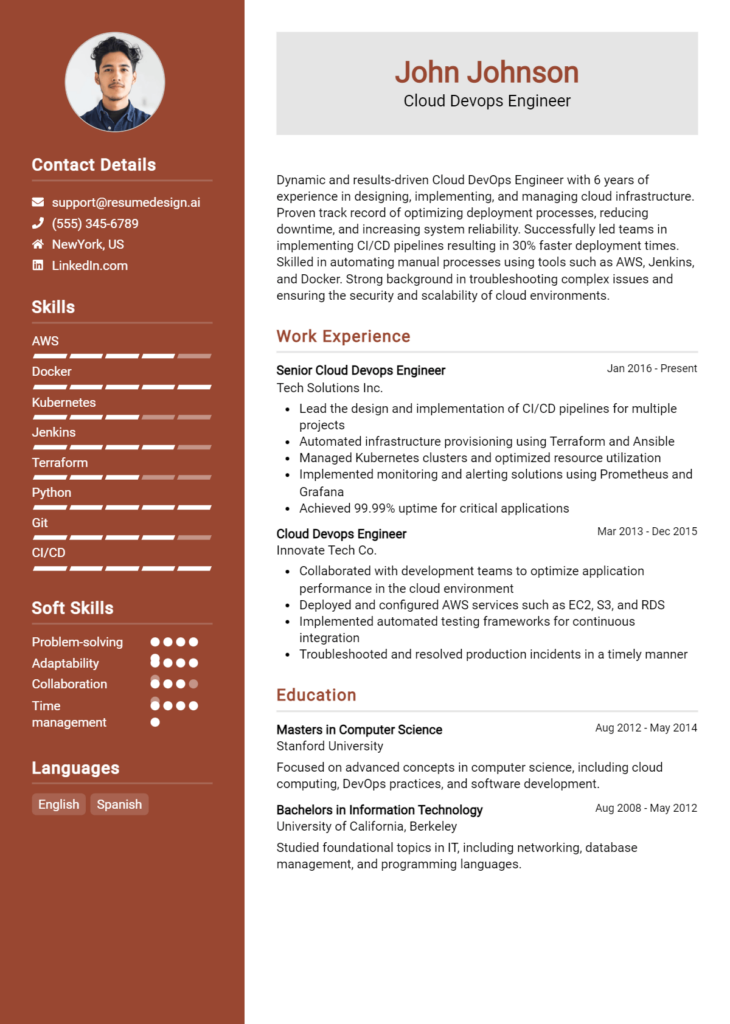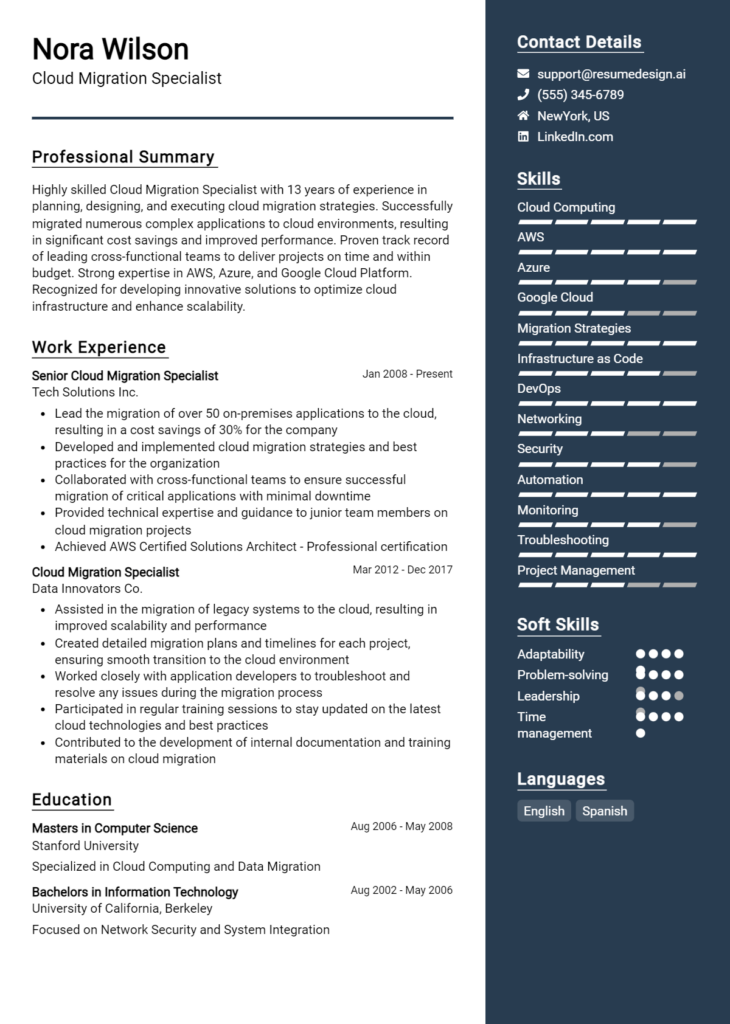Cloud Microservices Specialist Core Responsibilities
A Cloud Microservices Specialist is pivotal in ensuring seamless integration and operation of microservices across various platforms. This role demands strong technical expertise in cloud technologies, operational management, and exceptional problem-solving skills. Specialists collaborate with development, IT, and business teams, facilitating communication and aligning objectives. Their ability to design, deploy, and optimize microservices directly contributes to organizational efficiency and agility. A well-structured resume highlighting these competencies can effectively showcase a candidate's qualifications to prospective employers.
Common Responsibilities Listed on Cloud Microservices Specialist Resume
- Design and implement scalable microservices architecture.
- Collaborate with cross-functional teams to define service requirements.
- Monitor and optimize cloud resource utilization and performance.
- Ensure high availability and reliability of microservices.
- Develop and maintain CI/CD pipelines for microservices deployment.
- Implement security best practices for cloud services.
- Troubleshoot and resolve issues in a timely manner.
- Document microservices designs, processes, and best practices.
- Participate in code reviews and provide feedback to team members.
- Stay updated on emerging cloud technologies and trends.
- Provide training and support to team members on microservices practices.
High-Level Resume Tips for Cloud Microservices Specialist Professionals
In today's competitive job market, a well-crafted resume is crucial for Cloud Microservices Specialist professionals aiming to stand out to potential employers. Your resume often serves as the first impression you make, and it needs to effectively showcase your skills, achievements, and relevant experience in the cloud and microservices domain. A compelling resume not only highlights your technical competencies but also demonstrates your ability to drive results and contribute to organizational goals. This guide will provide practical and actionable resume tips specifically tailored for Cloud Microservices Specialist professionals to help you create a document that leaves a lasting impact.
Top Resume Tips for Cloud Microservices Specialist Professionals
- Tailor your resume to match the job description, emphasizing the skills and experiences that align with the specific roles you're applying for.
- Showcase relevant experience by detailing projects you've worked on that involve cloud architecture, microservices design, and deployment.
- Quantify your achievements with metrics wherever possible, such as percentage improvements in application performance or reductions in deployment times.
- Highlight industry-specific skills such as knowledge of AWS, Azure, or Google Cloud Platform, as well as experience with containerization tools like Docker and Kubernetes.
- Include certifications related to cloud and microservices, as these can significantly enhance your credibility and appeal to employers.
- Utilize action verbs to convey your contributions effectively, making your responsibilities and achievements stand out.
- Incorporate keywords from the job posting to optimize your resume for Applicant Tracking Systems (ATS) that many companies use.
- Keep your resume concise and focused, ideally limiting it to one page while ensuring it covers the most pertinent information.
- Use a professional format and clear headings to enhance readability and make it easy for hiring managers to navigate your resume.
By implementing these tips, you can significantly enhance your resume's effectiveness, increasing your chances of landing a job in the Cloud Microservices Specialist field. A targeted and well-presented resume will not only showcase your technical capabilities but also demonstrate your commitment to excellence, making you a more attractive candidate to potential employers.
Why Resume Headlines & Titles are Important for Cloud Microservices Specialist
In the competitive landscape of cloud computing, a Cloud Microservices Specialist plays a pivotal role in designing, developing, and managing microservices architectures that are scalable, resilient, and efficient. For candidates aspiring to secure a position in this field, the importance of a well-crafted resume headline or title cannot be overstated. A strong headline serves as the first impression, immediately grabbing the attention of hiring managers and succinctly summarizing a candidate's key qualifications in one impactful phrase. It should be concise, relevant, and directly aligned with the specific job being applied for, effectively setting the tone for the entire resume.
Best Practices for Crafting Resume Headlines for Cloud Microservices Specialist
- Keep it concise: Aim for a headline that is no more than 10 words.
- Make it role-specific: Tailor the headline to reflect the Cloud Microservices Specialist position.
- Highlight key skills: Incorporate relevant technical skills or certifications.
- Showcase experience: Mention years of experience or notable projects.
- Use action-oriented language: Start with strong verbs to convey proactivity.
- Incorporate industry keywords: Utilize terms that resonate with the cloud computing field.
- Avoid jargon: Ensure clarity by steering clear of overly technical terms that may confuse.
- Reflect your unique value: Highlight what sets you apart from other candidates.
Example Resume Headlines for Cloud Microservices Specialist
Strong Resume Headlines
"Experienced Cloud Microservices Architect with 7+ Years in Agile Environments"
“Certified AWS Developer Specializing in Scalable Microservices Solutions”
“Innovative Cloud Consultant Driving Microservices Transformation for Fortune 500 Companies”
Weak Resume Headlines
“Seeking Job in IT”
“Cloud Specialist”
The strong headlines are effective because they are specific and highlight the candidate's unique qualifications, such as years of experience, specific skills, and relevant achievements. They immediately communicate value to potential employers, making it clear why the candidate would be a great fit for the role. In contrast, weak headlines lack specificity and fail to convey any real information about the candidate's capabilities or aspirations, thereby diminishing the chances of capturing the hiring manager's interest.
Writing an Exceptional Cloud Microservices Specialist Resume Summary
A resume summary is a crucial component for a Cloud Microservices Specialist, as it serves as the first impression on hiring managers. A well-crafted summary quickly captures attention by highlighting the candidate's key skills, relevant experience, and significant accomplishments tailored to the job role. This brief yet impactful introduction should be concise, directly addressing the needs of the employer and showcasing the candidate's unique qualifications, ensuring that they stand out in a competitive job market.
Best Practices for Writing a Cloud Microservices Specialist Resume Summary
- Quantify achievements: Use numbers and metrics to demonstrate your impact in previous roles.
- Focus on relevant skills: Highlight specific skills that align with the job description, such as cloud platforms, microservices architecture, and DevOps practices.
- Tailor the summary: Customize your summary for each job application to reflect the specific requirements of the position.
- Use strong action verbs: Start sentences with powerful verbs to convey your contributions effectively.
- Be concise: Aim for 2-4 sentences that provide a snapshot of your qualifications without overwhelming the reader.
- Showcase industry knowledge: Mention familiarity with cloud technologies and microservices frameworks that are relevant to the role.
- Highlight soft skills: Include key interpersonal skills like teamwork, communication, and problem-solving that are vital in collaborative environments.
Example Cloud Microservices Specialist Resume Summaries
Strong Resume Summaries
Dynamic Cloud Microservices Specialist with over 5 years of experience in architecting, deploying, and managing scalable microservices on AWS. Successfully reduced deployment time by 30% through automation and CI/CD practices.
Results-driven Cloud Microservices Engineer with a proven track record of optimizing cloud solutions, achieving a 25% cost reduction in infrastructure spending while enhancing system reliability and performance metrics.
Innovative Cloud Microservices Developer skilled in Java and Kubernetes, with 4 years of hands-on experience developing and maintaining microservices architectures. Played a pivotal role in a project that increased application throughput by 40%.
Weak Resume Summaries
Experienced IT professional looking for a job in cloud computing and microservices.
Cloud Microservices Specialist with knowledge of various technologies. Eager to contribute to a team.
The strong resume summaries effectively highlight specific skills, quantify achievements, and demonstrate direct relevance to the role of a Cloud Microservices Specialist. They convey a clear picture of the candidate's capabilities and successes, making them appealing to hiring managers. In contrast, the weak summaries are vague and lack detail, failing to showcase any significant accomplishments or specific skills, which diminishes their impact and relevance to the job.
Work Experience Section for Cloud Microservices Specialist Resume
The work experience section of a Cloud Microservices Specialist resume is critical as it serves as a testament to the candidate's technical expertise, leadership capabilities, and their ability to deliver high-quality products in a cloud environment. This section not only highlights relevant skills in microservices architecture, cloud platforms, and DevOps practices, but it also emphasizes the candidate's experience in managing teams and projects. By quantifying achievements and aligning the experience with industry standards, candidates can effectively demonstrate their value to potential employers, making it essential for career advancement in the rapidly evolving tech landscape.
Best Practices for Cloud Microservices Specialist Work Experience
- Focus on specific technologies used in microservices and cloud solutions, such as AWS, Azure, or Docker.
- Quantify achievements with metrics, such as percentage improvements in performance or reductions in deployment times.
- Highlight leadership roles and team collaboration experiences, showcasing your ability to manage cross-functional teams.
- Use action verbs to convey a proactive approach to problem-solving and project execution.
- Align your experience with industry best practices and standards, such as Agile or DevOps methodologies.
- Tailor descriptions to match the job requirements, ensuring relevance to the potential employer's needs.
- Incorporate feedback from peer reviews or client testimonials to validate your contributions.
- Showcase continuous learning and certifications related to cloud technologies and microservices.
Example Work Experiences for Cloud Microservices Specialist
Strong Experiences
- Led a team of 10 engineers in the design and implementation of a microservices architecture that improved system scalability by 40% and reduced time-to-market for new features by 30%.
- Successfully migrated a monolithic application to a cloud-native microservices framework, resulting in a 50% increase in uptime and a 25% reduction in operational costs.
- Collaborated with cross-functional teams to develop and deploy 15 microservices, achieving 99.9% availability and reducing response times by 60%.
- Implemented CI/CD pipelines that increased deployment frequency by 70% while maintaining a 95% success rate on first-time deployments.
Weak Experiences
- Worked on some cloud projects and helped with microservices development.
- Participated in team meetings regarding cloud technologies.
- Contributed to a project that used microservices.
- Assisted in the deployment of applications in the cloud.
The examples provided above illustrate the contrast between strong and weak experiences. Strong experiences are characterized by specific, quantifiable outcomes and demonstrate leadership, technical proficiency, and collaboration within teams. They convey a clear picture of the candidate's impact on past projects, making them more compelling to prospective employers. In contrast, weak experiences lack detail and measurable results, making it difficult for hiring managers to assess the candidate's capabilities and contributions effectively.
Education and Certifications Section for Cloud Microservices Specialist Resume
The education and certifications section of a Cloud Microservices Specialist resume is critical as it showcases the candidate's academic achievements, relevant industry certifications, and commitment to ongoing professional development. This section not only highlights the knowledge and skills acquired through formal education but also emphasizes the candidate's dedication to staying current with industry trends and best practices in cloud technologies. By providing relevant coursework, certifications, and any specialized training, candidates can significantly enhance their credibility and demonstrate their alignment with the specific requirements of the Cloud Microservices Specialist role.
Best Practices for Cloud Microservices Specialist Education and Certifications
- Prioritize relevant degrees in Computer Science, Information Technology, or related fields.
- Include industry-recognized certifications, such as AWS Certified Solutions Architect or Google Cloud Professional Cloud Developer.
- Highlight any specialized training in microservices architecture, containerization, or cloud-native technologies.
- Provide details about relevant coursework that aligns with cloud computing and microservices principles.
- Keep the section concise but informative, avoiding unnecessary details that do not contribute to your qualifications.
- Update this section regularly to reflect new certifications and educational achievements.
- Use clear formatting to distinguish between degrees, certifications, and training for readability.
- Consider including online courses or bootcamps that demonstrate a commitment to continuous learning.
Example Education and Certifications for Cloud Microservices Specialist
Strong Examples
- Bachelor of Science in Computer Science, XYZ University, 2021
- AWS Certified Solutions Architect – Associate, 2023
- Google Cloud Professional Cloud Developer, 2022
- Microservices Architecture: Make it Real, Coursera, 2023
Weak Examples
- Associate Degree in General Studies, ABC Community College, 2018
- Certification in Microsoft Office Suite, 2020
- Old Sun Certified Java Programmer certification (acquired in 2015)
- High School Diploma, 2015
The strong examples are considered relevant because they directly align with the skills and knowledge necessary for a Cloud Microservices Specialist, showcasing both formal education and certifications that are recognized in the industry. In contrast, the weak examples reflect outdated or irrelevant qualifications that do not contribute to the candidate's ability to perform in the role, indicating a lack of focus on the required competencies in cloud computing and microservices.
Top Skills & Keywords for Cloud Microservices Specialist Resume
As a Cloud Microservices Specialist, possessing the right skills is crucial for success in a rapidly evolving technological landscape. Employers seek candidates who not only have a solid foundation in cloud architecture and microservices but also exhibit strong interpersonal and analytical abilities. A well-crafted resume that highlights both hard and soft skills can significantly enhance your chances of landing interviews. By effectively showcasing your expertise in cloud technologies and your ability to collaborate within teams, you can demonstrate that you are not just technically proficient but also an asset to any organization. To optimize your resume, focus on including relevant skills that align with the demands of the position.
Top Hard & Soft Skills for Cloud Microservices Specialist
Soft Skills
- Effective communication
- Problem-solving abilities
- Adaptability
- Team collaboration
- Critical thinking
- Attention to detail
- Time management
- Creativity
- Conflict resolution
- Leadership
Hard Skills
- Proficiency in cloud platforms (AWS, Azure, Google Cloud)
- Experience with microservices architecture
- Knowledge of containerization technologies (Docker, Kubernetes)
- Familiarity with API development and management
- Understanding of CI/CD pipelines
- Proficiency in programming languages (Java, Python, Node.js)
- Database management (SQL, NoSQL)
- Infrastructure as Code (IaC) frameworks (Terraform, Ansible)
- Monitoring and logging tools (Prometheus, Grafana)
- Security best practices in a cloud environment
By emphasizing these skills in your resume and showcasing your relevant work experience, you can position yourself as a strong candidate in the field of cloud microservices.
Stand Out with a Winning Cloud Microservices Specialist Cover Letter
Dear [Hiring Manager's Name],
I am excited to apply for the Cloud Microservices Specialist position at [Company Name], as advertised on [Job Board/Company Website]. With a robust background in cloud architecture and microservices development, I am well-equipped to contribute to your team’s goal of delivering scalable and efficient cloud solutions. My experience in designing, deploying, and managing microservices on cloud platforms such as AWS and Azure has honed my skills to meet the demands of modern application development.
In my previous role at [Previous Company Name], I successfully led a team to migrate a monolithic application to a microservices architecture, significantly improving the system’s performance and scalability. By leveraging containerization technologies like Docker and orchestration tools such as Kubernetes, we achieved a 40% reduction in deployment times while enhancing system reliability. Furthermore, my proactive approach towards CI/CD pipelines enabled faster iterations and deployment cycles, ensuring that our applications met the dynamic needs of our clients.
I am particularly drawn to this opportunity at [Company Name] because of your commitment to innovation and excellence in cloud technologies. I admire your initiatives in adopting microservices to enhance customer experiences and drive business growth. I am eager to bring my expertise in cloud-native solutions, API management, and DevOps practices to collaborate with your talented team and contribute to groundbreaking projects that push the boundaries of technology.
Thank you for considering my application. I look forward to the possibility of discussing how my skills and experiences align with the goals of [Company Name]. I am excited about the opportunity to contribute to your team and help shape the future of your cloud microservices strategy.
Sincerely,
[Your Name]
[Your Contact Information]
Common Mistakes to Avoid in a Cloud Microservices Specialist Resume
When crafting a resume for a Cloud Microservices Specialist position, it's crucial to present your skills and experiences effectively. However, many candidates make common mistakes that can hinder their chances of landing an interview. Understanding these pitfalls can help you create a compelling resume that highlights your qualifications and expertise in cloud architecture, microservices, and related technologies.
Lack of Relevant Keywords: Failing to include industry-specific keywords related to cloud technologies and microservices can lead to your resume being overlooked by applicant tracking systems (ATS).
Vague Job Descriptions: Providing generic descriptions of past roles instead of specific accomplishments can make it difficult for hiring managers to gauge your impact in previous positions.
Ignoring Metrics and Results: Not quantifying achievements with metrics (e.g., performance improvements, cost savings) can weaken your resume. Including numbers helps demonstrate the value you brought to your previous roles.
Overloading with Technical Jargon: While it's important to showcase your technical skills, using excessive jargon can make your resume difficult to read. Aim for a balance that highlights your expertise without alienating non-technical recruiters.
Neglecting Soft Skills: Focusing solely on technical abilities without mentioning soft skills such as teamwork, communication, and problem-solving may overlook essential attributes that employers seek in a Cloud Microservices Specialist.
Outdated Information: Including outdated technologies or irrelevant experiences can mislead hiring managers about your current capabilities. Always tailor your resume to reflect the most relevant and recent experiences.
Poor Formatting: A cluttered or unprofessional layout can distract from your content. Use clear headings, bullet points, and consistent formatting to enhance readability.
Failing to Customize for Each Application: Sending out a generic resume without tailoring it to the specific job description can make you seem unfocused. Customizing your resume shows your genuine interest in the position and aligns your skills with the employer's needs.
Conclusion
As a Cloud Microservices Specialist, your role is pivotal in designing, developing, and maintaining microservices architecture within cloud environments. This article has covered essential skills and qualifications for this position, including proficiency in cloud platforms like AWS, Azure, or Google Cloud, knowledge of containerization technologies such as Docker and Kubernetes, and an understanding of CI/CD practices. We also discussed the importance of strong programming skills in languages like Java, Python, or Node.js, as well as the necessity of effective communication and collaboration with cross-functional teams.
In conclusion, ensuring that your resume accurately reflects these skills and experiences is crucial for standing out in this competitive field. We encourage you to take the time to review and refine your Cloud Microservices Specialist resume. To assist you in this process, consider utilizing resources such as resume templates, resume builder, resume examples, and cover letter templates. Leverage these tools to create a compelling resume that showcases your expertise and positions you for success in your career.

